科普知识与现代技术 Popular science and modern technology
- 格式:doc
- 大小:23.50 KB
- 文档页数:2
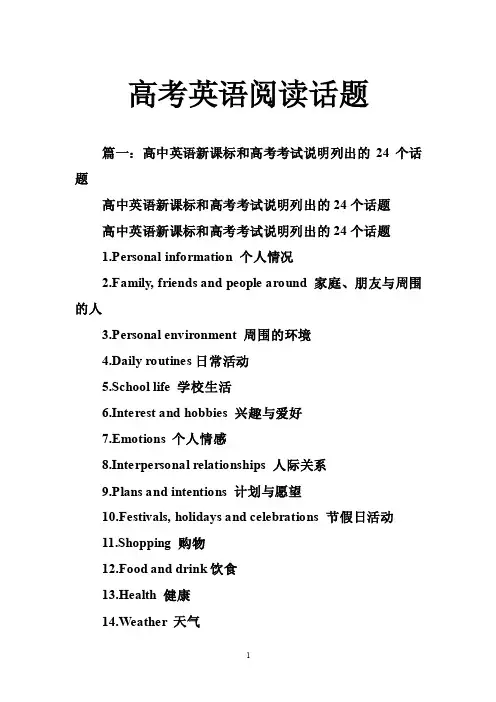
高考英语阅读话题篇一:高中英语新课标和高考考试说明列出的24个话题高中英语新课标和高考考试说明列出的24个话题高中英语新课标和高考考试说明列出的24个话题1.Personal information 个人情况2.Family, friends and people around 家庭、朋友与周围的人3.Personal environment 周围的环境4.Daily routines日常活动5.School life 学校生活6.Interest and hobbies 兴趣与爱好7.Emotions 个人情感8.Interpersonal relationships 人际关系9.Plans and intentions 计划与愿望10.Festivals, holidays and celebrations 节假日活动11.Shopping 购物12.Food and drink饮食13.Health 健康14.Weather 天气15.Entertainment and sports 文娱与体育16.Travel and transport 旅游与交通nguage learning 语言学习18.Nature 自然19.The world and the environment 世界与环境20.Popular science and modern technology 科普知识与现代技术21.T opical Issues 热点话题22.History and geography 历史与地理23.Society 社会24.Literature and art 文学与艺术研究近年的高考写作题不难发现所涉及的话题都在课标或考试说明列出的24个话题之内。
根据高考写作题的命题特点,可将这24个话题整合成16个话题进行备考。
高中英语话题作文归纳与训练1◆人物人品☆课标解读指本人、家人、邻居、同学、老师、朋友和其他人的情况介绍。
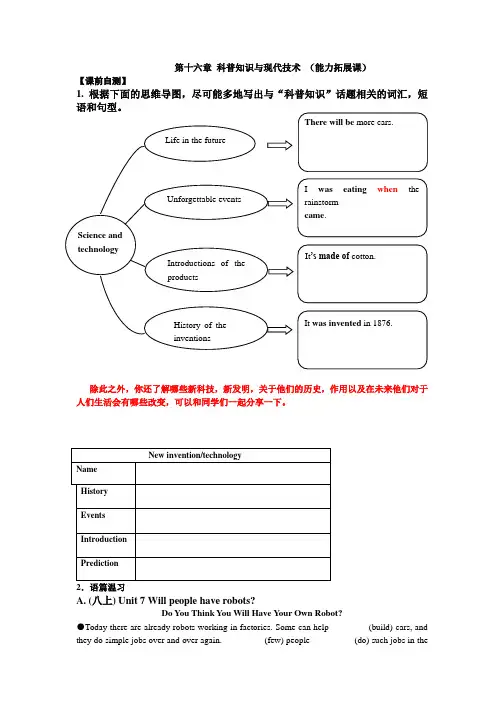
第十六章科普知识与现代技术(能力拓展课)【课前自测】1. 根据下面的思维导图,尽可能多地写出与“科普知识”话题相关的词汇,短●Today there are already robots working in factories. Some can help_________(build) cars, and they do simple jobs over and over again. _________(few) people__________(do) such jobs in thefuture because they are boring, but robots _______never______(get) bored. ●However, some scientists believe that although we can make robots________(move) like people, it _________(be) difficult to make them really think like a human. For example, scientist James White thinks that robots _______ never _________(be) able to wake up and know where they are. But many scientists disagree with Mr. White. They think that robots ________even_________(be) able to talk like humans in 25 to 50 years.●Some scientists believe that there____________(be) more robots in the future. However, they agree it may take hundreds of years. These new robots ________(have) many different shapes. Some _______( look) like humans, and others might look like animals.1.用所给的词适当形式填空,补全短文,并背诵。
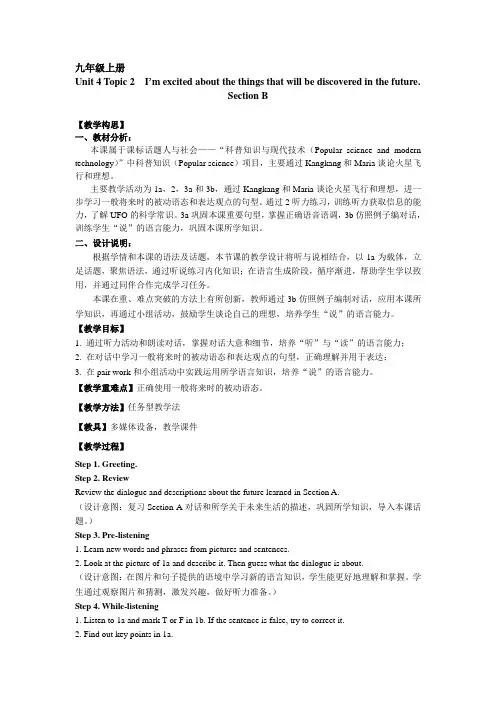
九年级上册Unit 4 Topic 2 I’m excited about the things that will be discovered in the future.Section B【教学构思】一、教材分析:本课属于课标话题人与社会——“科普知识与现代技术(Popular science and modern technology)”中科普知识(Popular science)项目,主要通过Kangkang和Maria谈论火星飞行和理想。
主要教学活动为1a,2,3a和3b,通过Kangkang和Maria谈论火星飞行和理想,进一步学习一般将来时的被动语态和表达观点的句型。
通过2听力练习,训练听力获取信息的能力,了解UFO的科学常识。
3a巩固本课重要句型,掌握正确语音语调,3b仿照例子编对话,训练学生“说”的语言能力,巩固本课所学知识。
二、设计说明:根据学情和本课的语法及话题,本节课的教学设计将听与说相结合,以1a为载体,立足话题,聚焦语法,通过听说练习内化知识;在语言生成阶段,循序渐进,帮助学生学以致用,并通过同伴合作完成学习任务。
本课在重、难点突破的方法上有所创新,教师通过3b仿照例子编制对话,应用本课所学知识,再通过小组活动,鼓励学生谈论自己的理想,培养学生“说”的语言能力。
【教学目标】1. 通过听力活动和朗读对话,掌握对话大意和细节,培养“听”与“读”的语言能力;2. 在对话中学习一般将来时的被动语态和表达观点的句型,正确理解并用于表达;3. 在pair work和小组活动中实践运用所学语言知识,培养“说”的语言能力。
【教学重难点】正确使用一般将来时的被动语态。
【教学方法】任务型教学法【教具】多媒体设备,教学课件【教学过程】Step 1. Greeting.Step 2. ReviewReview the dialogue and descriptions about the future learned in Section A.(设计意图:复习Section A对话和所学关于未来生活的描述,巩固所学知识,导入本课话题。
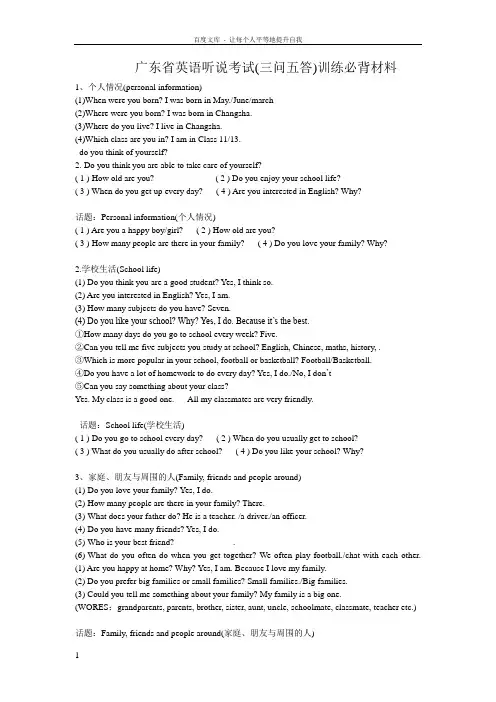
广东省英语听说考试(三问五答)训练必背材料1、个人情况(personal information)(1)When were you born? I was born in May./June/march(2)Where were you born? I was born in Changsha.(3)Where do you live? I live in Changsha.(4)Which class are you in? I am in Class 11/13.do you think of yourself?2.Do you think you are able to take care of yourself?( 1 ) How old are you? ( 2 ) Do you enjoy your school life?( 3 ) When do you get up every day? ( 4 ) Are you interested in English? Why?话题:Personal information(个人情况)( 1 ) Are you a happy boy/girl? ( 2 ) How old are you?( 3 ) How many people are there in your family? ( 4 ) Do you love your family? Why?2.学校生活(School life)(1) Do you think you are a good student? Yes, I think so.(2) Are you interested in English? Yes, I am.(3) How many subjects do you have? Seven.(4) Do you like your school? Why? Yes, I do. Because it’s the best.①How many days do you go to school every week? Five.②Can you tell me five subjects you study at school? English, Chinese, maths, history, .③Which is more popular in your school, football or basketball? Football/Basketball.④Do you have a lot of homework to do every day? Yes, I do./No, I don’t⑤Can you say something about your class?Yes. My class is a good one. All my classmates are very friendly.话题:School life(学校生活)( 1 ) Do you go to school every day? ( 2 ) When do you usually get to school?( 3 ) What do you usually do after school? ( 4 ) Do you like your school? Why?3、家庭、朋友与周围的人(Family, friends and people around)(1)Do you love your family? Yes, I do.(2)How many people are there in your family? There.(3)What does your father do? He is a teacher. /a driver./an officer.(4)Do you have many friends? Yes, I do.(5)Who is your best friend? _____________.(6)What do you often do when you get together? We often play football./chat with each other.(1) Are you happy at home? Why? Yes, I am. Because I love my family.(2) Do you prefer big families or small families? Small families./Big families.(3) Could you tell me something about your family? My family is a big one.(WORES:grandparents, parents, brother, sister, aunt, uncle, schoolmate, classmate, teacher etc.) 话题:Family, friends and people around(家庭、朋友与周围的人)( 1 ) Is your mother a doctor? ( 2 ) How old is your father?( 3 ) What do you often do when you stay at home? ( 4 ) Do you love your family? Why?4、日常活动(Daily routines)(1)Are you busy these days? Yes, I am.(2)Do you have classes from Monday to Friday? Yes, I do.(3)How do you usually go to school? By bus./ On foot./By bike.(4)Where do you have your lunch? At home./ At school.(5)How do you spend your free time? I watch TV./Play games./ play basketball.②What time do you usually go to school in the morning? At:7:00②Is your school for from your home? Yes, it is./No, it isn’t③What do you usually do on Sundays? I do some sports./I have a good rest.④What do you do in the morning? I do morning exercises./I have breakfast.1、Do you do exercise every day?2、What time do you usually get up?3、What do you usually do after school?4、What time do you go to bed?5、When do you usually have supper?6、How far is it from your home to your school?7、Do you watch TV every day? 8、How do you get to school?话题:Daily routines(日常活动)( 1 ) Do you play basketball every day? ( 2 ) What time do you usually get up?( 3 ) What do you usually do after supper? ( 4 ) Do you like watching TV? Why?5、周围的环境(personal environments)(1)Is there a supermarket near here? Yes, there is.(2)Where did you buy your schoolbag? In the supermarket.(3)How much is your bag? 50 yuan.(4)DO you like the bag? Why? Yes, I do.①Where is your hometown? Changsha.②Is there any river near your home? Yes, there is.③Do you live in the city or in the country? In the city.④Which do you prefer, living in the city or living in the country? Why?I prefer living in the country. Because the country is quite and the air is fresh.话题:Personal environments(周围的环境)(1)Is there a river near your home? (2)How often do you clean your classroom?(3)What can we do to keep our school nice and clean?(4)Do you think Changsha is a beautiful city? Why?6、兴趣与爱好(1)Do you like playing football? Yes, I do.(2)Are you interested in watching TV? Yes, I am.(3)What is your favorite color? Red./Blue.(4)Which subject do you like best? English./Maths./.(5)What do you usually do in your free time? I watch. TV.①DO you like sports? Yes, I do.②Do you have much time on sports? Yes, I do.③What is the most popular sport in China? Tabletennis.④When will the next Olympic Games be held in Beijing? In 2008.⑤How do you spend your free time? I listen to music./read some books.1、What kind of music do you like?2、Do you like pop singers/music?3、What kind of singers do you like best?4、What kind of movies do you like?5、Do you like watching TV? Why or why not?(WORDS:music, dance, do sports, computer games, collect stamps, collect coins, collect dolls, read books, newspapers, comics, listen to radio, watch TV, have parties, go for picnics)话题:Interests and hobbies (兴趣与爱好)(1)Do you like playing basketball?(2)Who is the best basketball player in your class?(3)What’s your hobby? (4)Is playing computer games too much good or bad? Why?7、个人感情(Emotions)(1) Are you happy today? Yes, I am. (2) Do you like pop music? Yes, I do.(3) Who is the most popular teacher in your school? .(4) Will you get angry if your friend hit you? Why? No. I won’t. Because I think friendship is the most important. (WORDS:Happy, sad, angry, upset, pleased, proud, lonely, worried, nervous, afraid, smile cry)话题:Emotions (个人感情)( 1 ) Are you happy today? ( 2 ) How are you getting on with your family members?( 3 ) Who is your favorite teacher? ( 4 ) Do you love your father? Why?8、人际关系(Interpersonal relationships)(1)Do you have any brothers or sisters? Yes, I do.(2)Who do you usually ask for help? My friends./My mother./My sister.(3)Do you have any good friends? Yes, I do.(4)Are you getting on well with your friends? Yes, I am.(5) Can you say something about your best friend? My best friend is …He is tall.话题:Interpersonal relationships (人际关系)( 1 ) Do you have any friends? ( 2 ) Who is your best friend?( 3 ) What do you often do when you’re with your friends?( 4 ) Can your parents be your friends? Why?话题:Language learning (语言学习)(1)Is it easy for you to learn English? (2) Who is your English teacher?(3)How to study English well? (4) Do you like Chinese? Why?(4)Do you have a foreign teacher in your school? Yes, we do.(5)Have you ever talked with a foreigner? Yes, I have.(6) How do you learn English? By reading aloud./ By listening to the radio./ By watching videos.17、自然(Nature)(1)Is there a garden in your school? Yes, there is.(2)What can you see in a garden? I can see flowers and grass.(3)How often do you go to the zoo? Once a year.(4)What’s your favorite animal? Cats.Why do you like the animal? Because they are cute and lovely.(5)Do you think it’s good to keep the animals in the zoo? Why or why not?No, I don’t think so. Because the animals are not free and they (WORDS:trees, bushes, grass, flowers/ dogs, cats, tigers, lions, sheep, endangered animals, pets, zoo)话题:Nature (自然)(1) Do you love the nature? (2) Have you ever been to seaside?(3) Which is bigger, the sun or the moon?(4) Where is the most beautiful place in our country? Why?18、世界和环境(The world and the environment)(1)Can you tell me five countries in the world? China, Great Britain, the USA, Canada, Japan(2) Which country do you want to travel to? Canada.(3)Do you like living in Changsha? Yes, I do.(4) What do you think of Changsha? It’s clean and beautiful./It’s a little crowded. (WORDS:countries:China, Great Britain, the United States, Australia, Canada, Japan, Russia, India Egypt/ clean, Dirty, crowed, polluted.)话题:The world and the environment(世界与环境)(1)Do you like snow? (2) What did you do when it snowed last winter?(3)What can we do to make our city nice and clean?(4) Do you think our environment is it better now? Why?19、科普知识与现代技术(Popular science aid modern technology)(1)Do you have a computer? Yes, I do.(2)How often do you surf the Internet? Twice/ Once a week.(3)What can you get from the Internet? Some information and news.(4)Do you think students should be allowed to play computer games? Why or why not?Yes, I think so. Because we can learn something new from the internet.话题:Popular science and modern technology (科普知识与现代技术)(1) Do you like science? (2) Have you got a computer?(3) Where do you have your IT class? (4) Do you think that internet is helpful? Why?20.口语考试中的难点问题1—1)What do you think of your school(1ife)?It’s great2)What do you think of our environment? It’s not so good.3)What do you think of your parents/teachers? They’re great.4)What do you often do wh en it’s hot in summer? I often go swimming.5)What do you often do on New Year’s Day? I often play with my family members.6)What do you usually do when you’re flee? I do some reading/shopping.7)What do you want to be when you grow up? A teacher8)What time do you usually have sports? After school:9)What can we do to improve our environment?We can plant some trees,protect our rivers and lakes and take buses instead of cars.10)What’s your hobby / your favorite food? P1aying soccer /Beef.11) What’s the weather like here in winter? It’s cold。
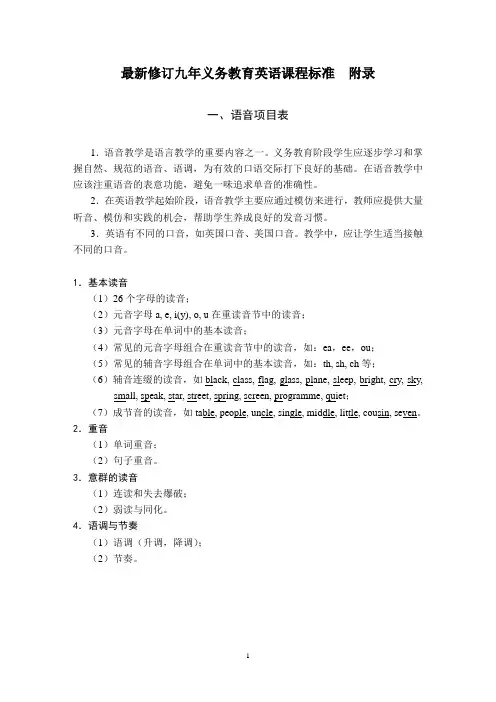
最新修订九年义务教育英语课程标准附录一、语音项目表1.语音教学是语言教学的重要内容之一。
义务教育阶段学生应逐步学习和掌握自然、规范的语音、语调,为有效的口语交际打下良好的基础。
在语音教学中应该注重语音的表意功能,避免一味追求单音的准确性。
2.在英语教学起始阶段,语音教学主要应通过模仿来进行,教师应提供大量听音、模仿和实践的机会,帮助学生养成良好的发音习惯。
3.英语有不同的口音,如英国口音、美国口音。
教学中,应让学生适当接触不同的口音。
1.基本读音(1)26个字母的读音;(2)元音字母a, e, i(y), o, u在重读音节中的读音;(3)元音字母在单词中的基本读音;(4)常见的元音字母组合在重读音节中的读音,如:ea,ee,ou;(5)常见的辅音字母组合在单词中的基本读音,如:th, sh, ch等;(6)辅音连缀的读音,如black, class, flag, glass, plane, sleep, bright, cry, sky, small, speak, star, street, spring, screen, programme, quiet;(7)成节音的读音,如table, people, uncle, single, middle, little, cousin, seven。
2.重音(1)单词重音;(2)句子重音。
3.意群的读音(1)连读和失去爆破;(2)弱读与同化。
4.语调与节奏(1)语调(升调,降调);(2)节奏。
二、语法项目表说明:本表所列语法项目均指这些项目的基本用法。
1.名词(1)可数名词及其单复数(2)不可数名词(3)专有名词(4)名词所有格2.代词(1)人称代词(2)物主代词(3)反身代词(4)指示代词(5)不定代词(6)疑问代词3.数词(1)基数词(2)序数词4.介词和介词短语5.连词6.形容词(比较级和最高级)7.副词(比较级和最高级)8.冠词9.动词(1)动词的基本形式(2)系动词(3)及物动词和不及物动词(4)助动词(5)情态动词10.时态(1)现在进行时(2)一般现在时(3)一般过去时(4)一般将来时(5)过去进行时(6)现在完成时11.被动语态(1)一般现在时的被动语态(2)一般过去时的被动语态(3)一般将来时的被动语态(4)情态动词的被动语态12.非谓语动词:动词不定式13.构词法(1)合成法(2)派生法(3)转化法(4)缩写和简写14.句子种类(1)陈述句(肯定式和否定式)(2)疑问句:一般疑问句、特殊疑问句、选择疑问句、反意疑问句(3)祈使句(4)感叹句15.句子成分(1)主语(2)谓语(3)表语(4)宾语(直接宾语和间接宾语)(5)定语(6)状语16.简单句的基本句型(1)主语+系动词+表语(2)主语+不及物动词(3)主语+及物动词+宾语(4)主语+及物动词+间接宾语+直接宾语(5)主语+及物动词+宾语+宾语补足语(6)there be句型17.并列复合句18.主从复合句(1)宾语从句(2)状语从句(3)定语从句(关系代词引导的定语从句)三、功能意念项目表1.社会交往(Social Communications)(1)问候(Greetings)(2)介绍(Introduction)(3)告别(Farewells )(4)感谢(Thanks )(5)道歉(Apologies)(6)邀请(Invitation)(7)请求允许(Asking for permission )(8)祝愿和祝贺(Expressing wishes and congratulations)(9)提供帮助(Offering help)(10) 接受或拒绝(acceptance and refusal)(11)约会(Making appointments )(12)打电话(Making telephone calls )(13)就餐(Having meals)(14)就医(Seeing the doctor)(15)购物(Shopping)(16)问路(Asking the way)(17)谈论天气(Talking about weather)(18)语言交际困难(Language difficulties in communication) (19)提醒注意(Reminding)(20)警告和禁止(Warning and prohibition)(21)劝告(Advice)(22)建议(Suggestions)2.态度(Attitudes)(1)同意和不同意(Agreement and disagreement)(2)喜欢和不喜欢(Likes and dislikes)(3)肯定和不肯定(Certainty and uncertainty)(4)可能和不可能(Possibility and impossibility)(5)能够和不能够(Ability and inability)(6)偏爱和优先选择(Preference)(7)意愿和打算(Intentions and plans)(8)希望和愿望(Hopes and wishes)(9)表扬和鼓励(Praise and encouragement)3.情感(Emotions)(1)高兴(Happiness)(2)惊奇(Surprise)(3)忧虑(Worries)(4)安慰(Reassurance)(5)满意(Satisfaction)(6)遗憾(Regret)(7)同情(Sympathy)(8)恐惧(Fear)(9)愤怒(Anger)4.时间(Time)(1)时刻(Point of time)(2)时段(Duration)(3)频度(Frequency)(4)时序(Sequence)5.空间(Space)(1)位置(Position)(2)方向(Direction)(3)距离(Distance)6.存在(Existence)(1)存在与不存在(Existence and non-existence)7.特征(Features)(1)形状(Shape)(2)颜色(Colour)(3)材料(Material)(4)价格(Price)(5)规格(Size)(6)年龄(Age)8.计量(Measurement)(1)长度(Length)(2)宽度(Width)(3)高度(Height)(4)数量(Number)9.比较(Comparison)(1)同级比较(Equal comparison)(2)差别比较(Comparative and superlative)(3)相似和差别(Similarity and difference)10.逻辑关系(Logical relations)(1)原因和结果(Cause and effect )(2)目的(Purpose)四、话题项目表1.个人情况(Personal information)(1) 个人信息(Personal data)(2) 家庭信息(Family data)(3) 学校信息(School data)(4) 兴趣与爱好(Interests and hobbies)(5) 工作与职业(Jobs and career)2.家庭、朋友与周围的人(Family, friends and people around)(1) 家人和亲友(Family and relatives)(2) 朋友(Friends)(3) 其他人(Other people)3.周围的环境(Personal environments)(1) 房屋与住所(Kinds of housing)(2) 居室(Rooms in homes)(3) 家具和家庭用品(Furniture & home items)(4) 社区(Community)4.日常活动(Daily routines)(1) 家庭生活(Life at home)(2) 学校生活(School life)(3) 周末活动(Weekend activities)5.学校(School)(1) 学校设施(School facilities)(2) 学校人员(People at school)(3) 学习科目(School subjects)(4) 学校活动(School activities)6.个人兴趣(Personal interests)(1) 游戏与休闲(Games and recreations)(2) 爱好(Hobbies)(3) 娱乐活动(Entertainment)(4) 旅游(Tourism)7.情感与情绪(Emotions)(1) 描述情感(Describing feelings)(2) 表达情绪(Expressing emotions)8.人际交往(Interpersonal communications)(1) 社会行为(Social behaviours)(2) 合作与交流(Cooperation and communication)9.计划与安排(Plans and arrangements)(1) 计划(Planning)(2) 安排(Arranging)10.节假日活动(Festivals, holidays and celebrations)(1) 节日与假日(Festivals and holidays)(2) 个人庆典(Personal celebrations)11.购物(Shopping)(1) 计划(Planning)(2) 商品(Products)(3) 选择(Selecting)(4) 付款(Paying)(5) 个人喜好(Personal preference)12.饮食(Food and drinks)(1) 食物(Food)(2) 饮料(Drinks)(3) 饮食习俗(Eating customs)(4) 点餐(Ordering food and drink)13.卫生与健康(Hygiene and health)(1) 身体部位(Parts of body)(2) 体育健身(Physical fitness and exercise)(3) 个人卫生(Personal hygiene)(4) 疾病(Illnesses)(5) 健康饮食(Health diet)(6) 医疗(Medical care)14.安全与救护(Safety and first aid)(1) 安全守则(Safety rules)(2) 意外(Accidents)(3) 急救(First aid)(4) 自我保护(Self protection)15.天气(Weather)(1) 描述天气情况(Describing weather)(2) 天气预报(Weather report)(3) 衣着与天气(Dressing for the weather)16.文娱与体育(Entertainment and sports)(1) 电影与戏剧(Movies and theatre)(2) 音乐与舞蹈(Music and dance)(3) 体育与赛事(Sports and games)17.旅游与交通(Travel and transport)(1) 旅行 (Travel)(2) 交通运输方式 (Methods of transportation)(3) 问路(Asking the way)(4) 交通标志(Road signs)(5) 使用地图(Reading maps)18.通讯( Communications )(1) 写信(Writing letters)(2) 打电话(Making phone calls)(3) 使用互联网(Using Internet)19.语言学习(Language learning)(1) 语言学习经历(Language learning experiences)(2) 语言与文化(Language and culture)(3) 语言学习的策略(Language learning strategies)(4) 体态语(Body language)20.自然(Nature)(1) 动物和植物(Animals and plants)(2) 山川与河流(Mountains and rivers)(3) 季节(Seasons)(4) 宇宙(Universe)(5) 人与自然(Man and nature)21.世界与环境(The world and the environment)(1) 国家与民族(Countries and nationalities)(2) 环境保护(Environmental protection)(3) 人口(Population)22.科普知识与现代技术(Popular science and modern technology)(1) 数字与数据(Numbers and data)(2) 科普知识(Popular science)(3) 发明与技术(Inventions and technological advances)(4) 信息技术(Information technology)23.历史与社会(History and society)(1) 中国历史与世界历史(History of China and the world)(2) 著名人物(Famous people)24.故事与诗歌(Stories and poems)(1) 故事(Stories)(2) 诗歌(Poems)(3) 短剧(Short plays)(4) 作家(Writers)附录五、技能教学参考表10六、词汇表说明:1.本表共收约1600个单词。


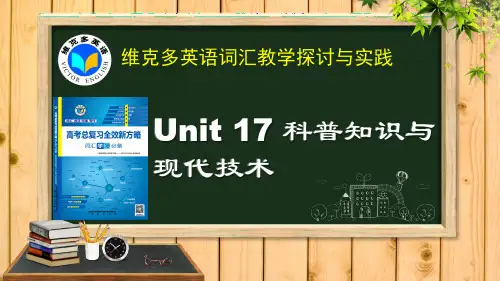
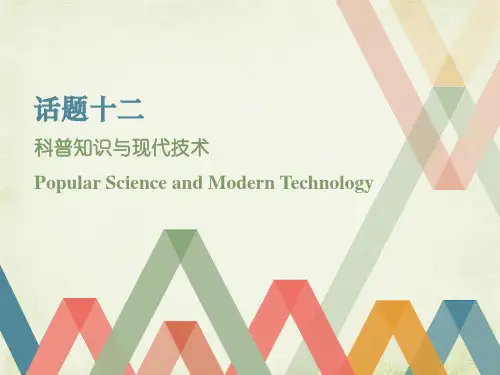
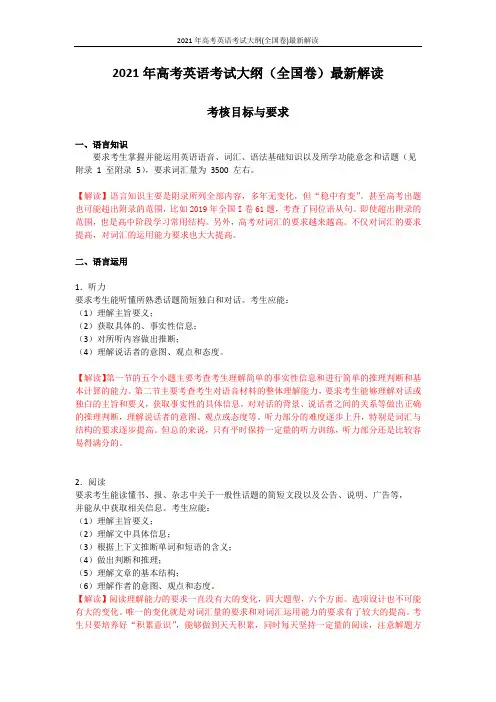
2021年高考英语考试大纲(全国卷)最新解读考核目标与要求一、语言知识要求考生掌握并能运用英语语音、词汇、语法基础知识以及所学功能意念和话题(见附录1 至附录5),要求词汇量为3500 左右。
【解读】语言知识主要是附录所列全部内容,多年无变化,但“稳中有变”。
甚至高考出题也可能超出附录的范围,比如2019年全国I卷61题,考查了同位语从句。
即使超出附录的范围,也是高中阶段学习常用结构。
另外,高考对词汇的要求越来越高。
不仅对词汇的要求提高,对词汇的运用能力要求也大大提高。
二、语言运用1.听力要求考生能听懂所熟悉话题简短独白和对话。
考生应能:(1)理解主旨要义;(2)获取具体的、事实性信息;(3)对所听内容做出推断;(4)理解说话者的意图、观点和态度。
【解读】第一节的五个小题主要考查考生理解简单的事实性信息和进行简单的推理判断和基本计算的能力。
第二节主要考查考生对语音材料的整体理解能力,要求考生能够理解对话或独白的主旨和要义,获取事实性的具体信息,对对话的背景、说话者之间的关系等做出正确的推理判断,理解说话者的意图、观点或态度等。
听力部分的难度逐步上升,特别是词汇与结构的要求逐步提高。
但总的来说,只有平时保持一定量的听力训练,听力部分还是比较容易得满分的。
2.阅读要求考生能读懂书、报、杂志中关于一般性话题的简短文段以及公告、说明、广告等,并能从中获取相关信息。
考生应能:(1)理解主旨要义;(2)理解文中具体信息;(3)根据上下文推断单词和短语的含义;(4)做出判断和推理;(5)理解文章的基本结构;(6)理解作者的意图、观点和态度。
【解读】阅读理解能力的要求一直没有大的变化,四大题型,六个方面。
选项设计也不可能有大的变化。
唯一的变化就是对词汇量的要求和对词汇运用能力的要求有了较大的提高。
考生只要培养好“积累意识”,能够做到天天积累,同时每天坚持一定量的阅读,注意解题方法的培养,阅读理解部分就容易得高分。
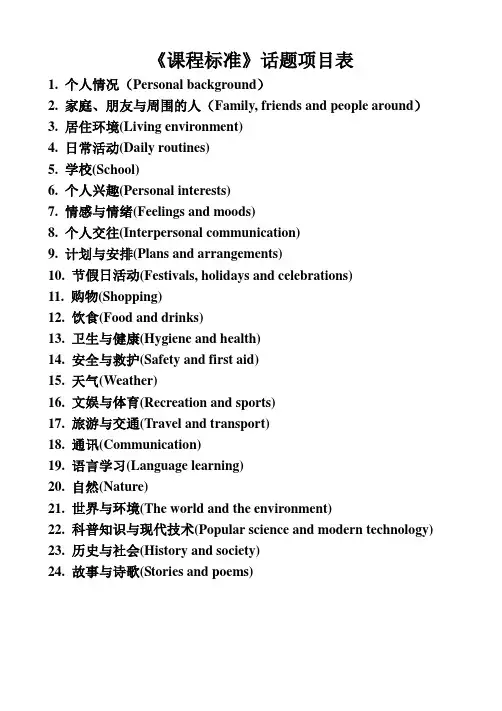
《课程标准》话题项目表1. 个人情况(Personal background)2. 家庭、朋友与周围的人(Family, friends and people around)3. 居住环境(Living environment)4. 日常活动(Daily routines)5. 学校(School)6. 个人兴趣(Personal interests)7. 情感与情绪(Feelings and moods)8. 个人交往(Interpersonal communication)9. 计划与安排(Plans and arrangements)10. 节假日活动(Festivals, holidays and celebrations)11. 购物(Shopping)12. 饮食(Food and drinks)13. 卫生与健康(Hygiene and health)14. 安全与救护(Safety and first aid)15. 天气(Weather)16. 文娱与体育(Recreation and sports)17. 旅游与交通(Travel and transport)18. 通讯(Communication)19. 语言学习(Language learning)20. 自然(Nature)21. 世界与环境(The world and the environment)22. 科普知识与现代技术(Popular science and modern technology)23. 历史与社会(History and society)24. 故事与诗歌(Stories and poems)2016年泉州卷第三部分阅读理解(A、B、C、E篇每小题10分,D篇每小题10分,满分10分)本语篇介绍意大利北部的一座古老城市——Siena, 考查的话题是《课程标准》第23个“历史与社会”。
51. Siena is an old city in the north of Italy. It began with agroup of people living on its hills over 2,900 years ago.Around the year 1100, Siena became an important businesscenter in Italy. In 1472, the first bank of the world was built inthis city and has been doing business ever since.Today Siena is famous for keeping its"old face". For example, its city walls, which helped keep the city safe in the past, are hundreds of years old now and look almost the same as before. Also,many old buildings are seen at the Piazza del Campo, the most important meeting place of the city. Few things have really changed in this center of public life for hundreds of years. Now people still go to the open space for sharing news, shopping, or playing sports. There is one more thing that helps keep Siena's old face: cars cannot enter the city most of the time.True, Siena is old, but it's beautifully old. People are welcome to visit this beautiful city and walk into the past.B、C两篇,根据短文内容,从每小题A、B、C三个选项中选出一个最佳答案.本语篇是一个寓言故事,属于《课程标准》第24个话题“故事与诗歌”。
现代科普知识和现代技术英语作文带中文翻译Scientific knowledge and modern technology have transformed the way we live and interact with the world around us. From groundbreaking discoveries in medicine and space exploration to the development of cutting-edge communication tools, science and technology have revolutionized every aspect of our lives.One area where scientific knowledge has had a significant impact is in healthcare. Advances in medical research have led to the development of new treatments, vaccines, and surgical techniques, improving the quality of life and extending life expectancy. Similarly, space exploration has expanded our understanding of the universe and inspired new technologies that benefit society as a whole.Modern technology, on the other hand, has revolutionized communication and connectivity. The internet, smartphones, and social media platforms have made it easier for people to connect, share information, and collaborate on a global scale. Additionally, technologies like artificial intelligence and robotics arereshaping industries, creating new opportunities for innovation and economic growth.However, along with these advancements come ethical and environmental concerns. The rapid pace of technological development raises questions about data privacy, cybersecurity, and the potential impact on employment. Furthermore, the reliance on fossil fuels and electronic waste generated by technology pose environmental challenges that need to be addressed.In conclusion, scientific knowledge and modern technology have the power to improve our lives and shape the future. It is crucial that we continue to explore and innovate responsibly, considering the ethical implications and environmental impact of our advancements.中文翻译:科学知识和现代技术已经彻底改变了我们的生活方式和与周围世界的互动方式。
外研社改版英语话题项目分布表1.个人情况(Personal information)(1) 个人情况(Personal data) B1M1个人信息, B2M2个人能力, B2M7过去信息, B4M2个人经历,(2) 家庭信息(Family data)(3) 学校信息(School data)(4) 兴趣与爱好(Interests and hobbies) B4M6爱好(5) 工作与职业(Jobs and careers) B4M10播音员,2.家庭、朋友与周围的人(Family, friends and people around)(6) 家人和亲友(Family and relatives) B1M2(7) 朋友(Friends) B6M8毕业前的惜别(8) 其他人(Other people)3.周围的环境(Personal environment)(9) 房屋与住所(Kinds of homes) B2M4未来,(10) 居室(Rooms in homes)(11) 家具和家庭用品(Furniture & household items)(12) 社区(Community) B2M6指问路, B3M2家乡与国家, B6M3古今生活对比4.日常活动(Daily routines)(13) 家庭生活(Life at home) B5M4独立生活经历(14) 学校生活(School life) B1M5学校生活B1M9游长城, B2M1失物招领, B5M6学校摄影比赛及结果通报B6M2学校及学校生活介绍B6M8毕业前的惜别与演讲(15) 周末活动(Weekend activities) B1M9 各国人活动,5.学校(School)(16) 学校设施(School facilities) B1M3, B2M4未来,(17) 学校人员(People at school)(18) 学习科目(School subjects) B1M5,(19) 学校活动(School activities) B1M5, B2M4未来,6.个人兴趣(Personal interests)(20) 游戏与休闲(Games and leisure)(21) 爱好(Hobbies) B1M8偏好, B4M6爱好,(22) 娱乐活动(Entertainments)(23) 旅游(Tourism)7.情感与情绪(Feelings and emotions)B4M1,(24) 描述情感(Describing feelings)(25) 表达情感(Expressing emotions)8.人际交往(Interpersonal communications)(26) 社会行为(Social behaviours) B3M11行为习俗, B5M5博物馆准则(27) 合作与交流(Cooperation and communication)B4M9友谊, B5M6沟通解决问题9.计划与安排(Plans and arrangements)(28) 计划(Planning) B2M3周末,(29) 安排(Arranging) B2M3周末,10.节假日活动(Festivals, holidays and celebrations)(30) 节日与假日(Festivals and holidays) B1M10春节, B5M2国庆圣诞感恩(31) 个人庆典(Personal celebrations)11.购物(Shopping) B2M5购物(32) 计划(Planning)(33) 商品(Products)(34) 选择(Selecting)(35) 付款(Paying)(36) 个人喜好(Personal preference)12.饮食(Food and drink )(37) 食物(Food)B1M4 B6M6西方食物(38) 饮料(Drinks)B1M4(39) 饮食习俗(Eating customs)B6M6西餐习俗(40) 点餐(Ordering food and drink)13.卫生与健康(Hygiene and health)(41) 身体部位(Parts of body)(42) 体育健身(Physical fitness and exercise) B4M4看病与健身, B6M5健康生活五原则(43) 个人卫生(Personal hygiene)(44) 疾病(Illnesses)(45) 健康饮食(Health diet) B6M5健康生活五原则(46) 医疗(Medical care) B4M4看病与健身,14.安全与救护(Safety and first aid)(47) 安全守则(Safety rules) B3M12help, B6M4爬山安全注意事项(48) 意外(Accidents) B3M8事故,(49) 急救(First aid) B3M12help, B6M5徒步摔后处理(50) 自我保护(Self protection) B5M4独自在家自我保护15. 天气(Weather)(51) 描述天气情况(Describing weather) B3M10,(52) 天气预报(Weather report) B3M10,(53) 衣着与天气(Dressing for the weather)16.文娱与体育(Recreation and sports)(54) 电影与戏剧(Movies and theatre) B3M5戏剧与电影,(55) 音乐与舞蹈(Music and dance) B2M12音乐,(56) 体育与赛事(Sports and matches) B3M3体育B5M8赛事与刘翔之训练17.旅游与交通(Travel and transport)(57) 旅行(Travel) B2M10, B4M8休假旅行, B5M1旅行B5M9澳大利亚游记(58) 交通运输方式(Modes of transportation) B2M10, B3M17交通方式, B6M1乘用交通工具及问题(59) 交通标志(Traffic signs)(60) 使用地图(Reading maps) B5M5 博物馆准则18.通讯(Communications)(61) 写信(Writing letters)(62) 打电话(Making phone calls)(63) 使用互联网(Using the Internet) B1M7,19. 语言学习( Language learning)(64) 语言学习经历(Language learning experiences) B6M7英语学习经历与建议(65) 语言与文化(Language and culture) B1M9 各国人活动B6M7你和我的英语(66) 语言学习的策略(Language learning strategies) B3M1如何学英语, B4M7国外暑期课程, B6M7英语学习经历与建议(67) 体态语(Body language) B2M11,20.自然(Nature)(68) 动物和植物(Animals and plants)B1M6动物, B4M8旅游公园,(69) 山川与河流(Mountains and rivers) B5M1自然景观(70) 季节(Seasons)(71) 宇宙(Universe)B4M3太空之旅,(72) 人与自然(Man and nature) B3M6动物保护,21.世界与环境(The world and the environment)(73) 国家与民族(Countries and nationalities) B5M9澳大利亚(74) 环境保护(Environmental protection)(75) 人口(Population) B3M9,22.科普知识与现代技术(Popular science and modern technology)(76) 数字与数据(Numbers and data)(77) 科普知识(Popular science)(78) 发明与技术(Inventions and technological advances) B5M9发明与技术(79) 信息技术(Information technology)23.历史与社会(History and society)(80) 中国历史与世界历史(History of China and the world)(81) 著名人物(Famous people) B5M3邓亚平、白求恩24.故事与诗歌(Stories and poems)(82) 故事(Stories) B2M8故事, B3M7著名故事, B4M5卡通故事, B5M7汤姆索亚历险记书评(83) 诗歌(Poems)(84) 短剧(Short plays)(85) 作家(Writers) B2M9作家, B5M7作家孔子、莎士比亚、马克吐温。
关于科普知识与现代技术的英语作文八年级全文共3篇示例,供读者参考篇1The Importance of Popular Science Knowledge and Modern TechnologyIn today's rapidly advancing world, the importance of keeping up with popular science knowledge and modern technology cannot be understated. It is essential for individuals to have a basic understanding of scientific principles and the latest technological advancements in order to navigate the complexities of modern life. This is especially true for students in the eighth grade, who are at a crucial stage in their education and development.Popular science knowledge refers to the understanding of scientific concepts and ideas that are accessible to the general public. This can include topics such as how the human body works, the significance of biodiversity, and the causes and effects of climate change. By learning popular science knowledge, students can increase their awareness of the world around them and develop a greater appreciation for the natural sciences.In addition, having a basic understanding of modern technology is essential in today's digital age. From smartphones and social media to artificial intelligence and virtual reality, technology plays a significant role in our daily lives. By staying informed about the latest technological advancements, students can better adapt to new technologies and harness them to improve their academic performance and personal development.Furthermore, popular science knowledge and modern technology go hand in hand in many ways. For example, advancements in technology have allowed scientists to make groundbreaking discoveries in fields such as medicine, genetics, and space exploration. By understanding the basic scientific principles behind these discoveries, students can better appreciate the impact that technology has on society and the world at large.Moreover, popular science knowledge and modern technology can help students develop critical thinking skills and problem-solving abilities. By learning how to analyze and evaluate scientific information, students can become more discerning consumers of information and make informed decisions about their health, education, and future careers. Additionally, by mastering the use of modern technology,students can enhance their communication skills, collaboration abilities, and creativity, all of which are essential for success in the 21st century.In conclusion, popular science knowledge and modern technology are indispensable tools for students in the eighth grade and beyond. By acquiring a basic understanding of scientific concepts and keeping abreast of the latest technological advancements, students can expand their horizons, enrich their education, and prepare themselves for the challenges and opportunities of the future. As the world becomes increasingly interconnected and technologically advanced, it is vital for students to embrace popular science knowledge and modern technology as essential components of their education and personal growth.篇2The Importance of Science Popularization and Modern TechnologyScience popularization is the process of making scientific knowledge accessible to the general public. It plays a crucial role in educating people about scientific concepts, fostering curiosity and critical thinking skills, and ultimately promoting thedevelopment of society. In the era of modern technology, science popularization is more important than ever before, as it helps bridge the gap between scientists and the public, and ensures that the benefits of scientific advancements are understood and appreciated by all.One of the key aspects of science popularization is to communicate complex scientific ideas in a way that is easy to understand for the general public. This can be done through various mediums, such as educational programs, popular science books, and interactive exhibitions. By breaking down scientific concepts into digestible chunks, science popularization helps to demystify science and make it more accessible to people of all ages and backgrounds.Furthermore, science popularization plays a crucial role in promoting scientific literacy and critical thinking skills. In today's world, where misinformation and pseudoscience are rampant, it is more important than ever for people to be able to distinguish between fact and fiction, and to make informed decisions based on evidence and reason. Science popularization helps to cultivate these skills by teaching people how to evaluate scientific claims, question assumptions, and think critically about the world around them.Moreover, science popularization is essential for fostering a sense of wonder and curiosity about the natural world. By showcasing the beauty and complexity of science, science popularization inspires people to ask questions, seek out answers, and engage with the world around them. This sense of wonder can lead to a lifelong interest in science and technology, and ultimately contribute to the advancement of society as a whole.In the era of modern technology, science popularization is more important than ever before. With the rapid pace of scientific advancements, it is essential that the public is kept informed about the latest breakthroughs and developments in science and technology. Science popularization helps to bridge the gap between scientists and the public, ensuring that the benefits of scientific advancements are understood and appreciated by all.One of the key ways in which science popularization is facilitated in the modern era is through the use of technology. The internet, social media, and digital platforms have revolutionized the way in which scientific information is disseminated to the public. Through online articles, videos, podcasts, and interactive websites, people can access a wealth ofscientific knowledge at their fingertips, from the comfort of their own homes.Furthermore, modern technology has also opened up new opportunities for interactive and immersive science experiences. Virtual reality, augmented reality, and other digital technologies can be used to create engaging and educational experiences that bring scientific concepts to life in a way that is both entertaining and informative. These technologies have the potential to revolutionize science popularization, making it more engaging, accessible, and impactful than ever before.In conclusion, science popularization and modern technology play a crucial role in promoting scientific literacy, critical thinking skills, and a sense of wonder and curiosity about the natural world. By making scientific knowledge accessible to the general public, science popularization helps to bridge the gap between scientists and society, and ensure that the benefits of scientific advancements are understood and appreciated. In the era of modern technology, science popularization is more important than ever before, as it has the potential to revolutionize the way in which scientific information is disseminated and engage people in the wonders of the natural world.篇3The Importance of Popular Science Knowledge and Modern TechnologyIn today's rapidly changing world, the importance of popular science knowledge and modern technology can never be underestimated. From our daily lives to the development of society as a whole, these two elements play a crucial role in shaping our world and preparing us for the challenges of the future.Popular science knowledge, also known as scientific literacy, is the understanding and appreciation of the basic principles of science and how they impact our lives. It helps us make informed decisions on important issues such as healthcare, the environment, and technology. With the advancement of science and technology, it is more important than ever to have a basic understanding of these concepts to navigate the complexities of the modern world.Modern technology, on the other hand, refers to the tools and innovations that have revolutionized how we live, work, and communicate. From smartphones and social media to artificial intelligence and renewable energy, technology has transformedevery aspect of our lives. It has made communication faster and more efficient, connected us to people and information from around the world, and opened up new opportunities for creativity and innovation.Together, popular science knowledge and modern technology provide us with the tools and understanding we need to tackle the challenges of the 21st century. They enable us to address pressing issues such as climate change, healthcare disparities, and global pandemics, and to create a more sustainable and equitable future for all.In conclusion, popular science knowledge and modern technology are essential components of a modern society. By investing in education, research, and innovation in these areas, we can empower individuals and communities to thrive in an increasingly complex and interconnected world. Let us embrace the opportunities that science and technology offer and work towards a brighter and more sustainable future for all.。
本文部分内容来自网络整理,本司不为其真实性负责,如有异议或侵权请及时联系,本司将立即删除!== 本文为word格式,下载后可方便编辑和修改! ==知识英语咋写篇一:话题 20 如何用英语描写科普知识与现代技术话题 20 如何用英语描写科普知识与现代技术Popular science andmodern tec(来自:WWw. : 知识英语咋写 )hnology必走三步据 201X 年 10 月 25 日东方卫视报道,日本本田公司的机器人阿西莫在东京亮相,它展示了许多新的功能:跑步,上楼,端茶倒水等。
请以“About Future Asimo”为题,谈自己对未来功能强大的智能机器人阿西莫的观点。
应包含以下要点:1.一部分人认为它会对人类有利,会使人类的生活更便捷,更丰富多彩;2.一部分人认为它会给人类带来威胁,可能扰乱社会秩序,危害人类安全;3.发表你自己对阿西莫利弊的看法。
要求:1.可增加细节,以使行文连贯。
2.词数:100 左右。
,第一步:认真审题,提炼要点一审体裁:本文属于议论文。
二审结构:本文可采用三段式,先介绍,然后陈述两种观点,最后发表个人的看法。
三审要点:用英语思维,理出写作要点。
1.It was reported that.../the famous Japanese Honda Company/newly-made robot,Asimo in Tokyo2.has more new functions/running/climbing stairs3.bring us more advantages4.become more convenient and colorful5.become a threat to our mankind/disturb man's normal social order6.in the control of Asimo7.make good use of its advantages/try our best to avoid its disadvantages第二步:紧扣主题,扩点成句1.It was reported that the famous Japanese Honda Company showed its newly-made robot,Asimo in Tokyo.2.Asimo has more new functions,such as running,climbing stairs and so on.3.Some people believe that it can bring us more advantages.4.The whole world and our life will become more convenient and colorful.5.Others think the future Asimo will become a threat to our mankind.It can possibly disturb man's normal social order.6.Human beings could be in the control of Asimo.7.We should make good use of its advantages and try our best toavoid its disadvantages.第三步:补充修改,连句成篇About Future AsimoIt was reported that the famous Japanese Honda Company showed its newly-made robot,Asimo in Tokyo.This time,Asimo has more new functions,such as running,climbing stairs and so on,whichsurprised many people.The future Asimo will be moreintellectual.But what effect will Asimo have on human beings in the future?Some people believe that it can bring us more advantages.The whole world and our life will become more convenient and colorful.However,others think the future Asimo will become athreat to mankind because it can possibly disturb man's normal social order.What's worse,human beings could be in the control of Asimo.In my opinion,we should make good use of its advantages.But for its disadvantages,we should try our best to avoid them,or make them controlled.In a word,the future Asimo a great assistant of human beings.满分作文——满分说明文六在信息时代,随着网络的发展,它在人们日常生活中起着越来越重要的作用,上网人数与日俱增。
最新修订九年义务教育英语课程标准附录一、语音项目表1.语音教学是语言教学的重要内容之一。
义务教育阶段学生应逐步学习和掌握自然、规范的语音、语调,为有效的口语交际打下良好的基础。
在语音教学中应该注重语音的表意功能,避免一味追求单音的准确性。
2.在英语教学起始阶段,语音教学主要应通过模仿来进行,教师应提供大量听音、模仿和实践的机会,帮助学生养成良好的发音习惯。
3.英语有不同的口音,如英国口音、美国口音。
教学中,应让学生适当接触不同的口音。
1.基本读音(1)26个字母的读音;(2)元音字母a, e, i(y), o, u在重读音节中的读音;(3)元音字母在单词中的基本读音;(4)常见的元音字母组合在重读音节中的读音,如:ea,ee,ou;(5)常见的辅音字母组合在单词中的基本读音,如:th, sh, ch等;(6)辅音连缀的读音,如black, class, flag, glass, plane, sleep, bright, cry, sky, small, speak, star, street, spring, screen, programme, quiet;(7)成节音的读音,如table, people, uncle, single, middle, little, cousin, seven。
2.重音(1)单词重音;(2)句子重音。
3.意群的读音(1)连读和失去爆破;(2)弱读与同化。
4.语调与节奏(1)语调(升调,降调);(2)节奏。
二、语法项目表说明:本表所列语法项目均指这些项目的基本用法。
1.名词(1)可数名词及其单复数(2)不可数名词(3)专有名词(4)名词所有格2.代词(1)人称代词(2)物主代词(3)反身代词(4)指示代词(5)不定代词(6)疑问代词3.数词(1)基数词(2)序数词4.介词和介词短语5.连词6.形容词(比较级和最高级)7.副词(比较级和最高级)8.冠词9.动词(1)动词的基本形式(2)系动词(3)及物动词和不及物动词(4)助动词(5)情态动词10.时态(1)现在进行时(2)一般现在时(3)一般过去时(4)一般将来时(5)过去进行时(6)现在完成时11.被动语态(1)一般现在时的被动语态(2)一般过去时的被动语态(3)一般将来时的被动语态(4)情态动词的被动语态12.非谓语动词:动词不定式13.构词法(1)合成法(2)派生法(3)转化法(4)缩写和简写14.句子种类(1)陈述句(肯定式和否定式)(2)疑问句:一般疑问句、特殊疑问句、选择疑问句、反意疑问句(3)祈使句(4)感叹句15.句子成分(1)主语(2)谓语(3)表语(4)宾语(直接宾语和间接宾语)(5)定语(6)状语16.简单句的基本句型(1)主语+系动词+表语(2)主语+不及物动词(3)主语+及物动词+宾语(4)主语+及物动词+间接宾语+直接宾语(5)主语+及物动词+宾语+宾语补足语(6)there be句型17.并列复合句18.主从复合句(1)宾语从句(2)状语从句(3)定语从句(关系代词引导的定语从句)三、功能意念项目表1.社会交往(Social Communications)(1)问候(Greetings)(2)介绍(Introduction)(3)告别(Farewells )(4)感谢(Thanks )(5)道歉(Apologies)(6)邀请(Invitation)(7)请求允许(Asking for permission )(8)祝愿和祝贺(Expressing wishes and congratulations)(9)提供帮助(Offering help)(10) 接受或拒绝(acceptance and refusal)(11)约会(Making appointments )(12)打电话(Making telephone calls )(13)就餐(Having meals)(14)就医(Seeing the doctor)(15)购物(Shopping)(16)问路(Asking the way)(17)谈论天气(Talking about weather)(18)语言交际困难(Language difficulties in communication) (19)提醒注意(Reminding)(20)警告和禁止(Warning and prohibition)(21)劝告(Advice)(22)建议(Suggestions)2.态度(Attitudes)(1)同意和不同意(Agreement and disagreement)(2)喜欢和不喜欢(Likes and dislikes)(3)肯定和不肯定(Certainty and uncertainty)(4)可能和不可能(Possibility and impossibility)(5)能够和不能够(Ability and inability)(6)偏爱和优先选择(Preference)(7)意愿和打算(Intentions and plans)(8)希望和愿望(Hopes and wishes)(9)表扬和鼓励(Praise and encouragement)3.情感(Emotions)(1)高兴(Happiness)(2)惊奇(Surprise)(3)忧虑(Worries)(4)安慰(Reassurance)(5)满意(Satisfaction)(6)遗憾(Regret)(7)同情(Sympathy)(8)恐惧(Fear)(9)愤怒(Anger)4.时间(Time)(1)时刻(Point of time)(2)时段(Duration)(3)频度(Frequency)(4)时序(Sequence)5.空间(Space)(1)位置(Position)(2)方向(Direction)(3)距离(Distance)6.存在(Existence)(1)存在与不存在(Existence and non-existence)7.特征(Features)(1)形状(Shape)(2)颜色(Colour)(3)材料(Material)(4)价格(Price)(5)规格(Size)(6)年龄(Age)8.计量(Measurement)(1)长度(Length)(2)宽度(Width)(3)高度(Height)(4)数量(Number)9.比较(Comparison)(1)同级比较(Equal comparison)(2)差别比较(Comparative and superlative)(3)相似和差别(Similarity and difference)10.逻辑关系(Logical relations)(1)原因和结果(Cause and effect )(2)目的(Purpose)四、话题项目表1.个人情况(Personal information)(1) 个人信息(Personal data)(2) 家庭信息(Family data)(3) 学校信息(School data)(4) 兴趣与爱好(Interests and hobbies)(5) 工作与职业(Jobs and career)2.家庭、朋友与周围的人(Family, friends and people around)(1) 家人和亲友(Family and relatives)(2) 朋友(Friends)(3) 其他人(Other people)3.周围的环境(Personal environments)(1) 房屋与住所(Kinds of housing)(2) 居室(Rooms in homes)(3) 家具和家庭用品(Furniture & home items)(4) 社区(Community)4.日常活动(Daily routines)(1) 家庭生活(Life at home)(2) 学校生活(School life)(3) 周末活动(Weekend activities)5.学校(School)(1) 学校设施(School facilities)(2) 学校人员(People at school)(3) 学习科目(School subjects)(4) 学校活动(School activities)6.个人兴趣(Personal interests)(1) 游戏与休闲(Games and recreations)(2) 爱好(Hobbies)(3) 娱乐活动(Entertainment)(4) 旅游(Tourism)7.情感与情绪(Emotions)(1) 描述情感(Describing feelings)(2) 表达情绪(Expressing emotions)8.人际交往(Interpersonal communications)(1) 社会行为(Social behaviours)(2) 合作与交流(Cooperation and communication)9.计划与安排(Plans and arrangements)(1) 计划(Planning)(2) 安排(Arranging)10.节假日活动(Festivals, holidays and celebrations)(1) 节日与假日(Festivals and holidays)(2) 个人庆典(Personal celebrations)11.购物(Shopping)(1) 计划(Planning)(2) 商品(Products)(3) 选择(Selecting)(4) 付款(Paying)(5) 个人喜好(Personal preference)12.饮食(Food and drinks)(1) 食物(Food)(2) 饮料(Drinks)(3) 饮食习俗(Eating customs)(4) 点餐(Ordering food and drink)13.卫生与健康(Hygiene and health)(1) 身体部位(Parts of body)(2) 体育健身(Physical fitness and exercise)(3) 个人卫生(Personal hygiene)(4) 疾病(Illnesses)(5) 健康饮食(Health diet)(6) 医疗(Medical care)14.安全与救护(Safety and first aid)(1) 安全守则(Safety rules)(2) 意外(Accidents)(3) 急救(First aid)(4) 自我保护(Self protection)15.天气(Weather)(1) 描述天气情况(Describing weather)(2) 天气预报(Weather report)(3) 衣着与天气(Dressing for the weather)16.文娱与体育(Entertainment and sports)(1) 电影与戏剧(Movies and theatre)(2) 音乐与舞蹈(Music and dance)(3) 体育与赛事(Sports and games)17.旅游与交通(Travel and transport)(1) 旅行 (Travel)(2) 交通运输方式 (Methods of transportation)(3) 问路(Asking the way)(4) 交通标志(Road signs)(5) 使用地图(Reading maps)18.通讯( Communications )(1) 写信(Writing letters)(2) 打电话(Making phone calls)(3) 使用互联网(Using Internet)19.语言学习(Language learning)(1) 语言学习经历(Language learning experiences)(2) 语言与文化(Language and culture)(3) 语言学习的策略(Language learning strategies)(4) 体态语(Body language)20.自然(Nature)(1) 动物和植物(Animals and plants)(2) 山川与河流(Mountains and rivers)(3) 季节(Seasons)(4) 宇宙(Universe)(5) 人与自然(Man and nature)21.世界与环境(The world and the environment)(1) 国家与民族(Countries and nationalities)(2) 环境保护(Environmental protection)(3) 人口(Population)22.科普知识与现代技术(Popular science and modern technology)(1) 数字与数据(Numbers and data)(2) 科普知识(Popular science)(3) 发明与技术(Inventions and technological advances)(4) 信息技术(Information technology)23.历史与社会(History and society)(1) 中国历史与世界历史(History of China and the world)(2) 著名人物(Famous people)24.故事与诗歌(Stories and poems)(1) 故事(Stories)(2) 诗歌(Poems)(3) 短剧(Short plays)(4) 作家(Writers)附录五、技能教学参考表10六、词汇表说明:1.本表共收约1600个单词。
科普知识与现代技术Popular science and modern technology Science and Technology Influence Life
As we can see, science and technology have been deeply influencing our life. Take our school for example.
Now there are several HD-cameras monitoring the whole campus in case of emergency or school bullying. At meal time, we can watch TV news in the dinning hall, learning the latest international and domestic events. Not only can our teachers use multimedia equipment to make their classes more lively, but also they can mark papers on the computer, which greatly improves the efficiency of paper-scoring. Additionally, we can do many things conveniently, such as paying by Alipay, getting food by card, going to school by shared bike and so on.
In a word, it is the development of science and technology that makes such a comfortable and convenient life available to us.
参考译文
科学技术影响生活
正如我们所看到的,科学技术已经深深地影响了我们的生活。
以我们学校为例:
现在有几个HD-camera 监控整个校园,以防发生紧急情况或校园欺凌事件。
吃饭的时候,我们可以在餐厅里看电视新闻,学习最新的国际和国内事件。
我们的老师不仅可以使用多媒体设备让课堂更生动,而且可以在电脑上批改作业,这也大大提高了工作效率。
此外,我们做事情也变得方便,如支付宝支付、用校园卡购买食物、骑自行车上学等等。
总而言之,正是科技的发展使我们能够拥有如此舒适、方便的生活。